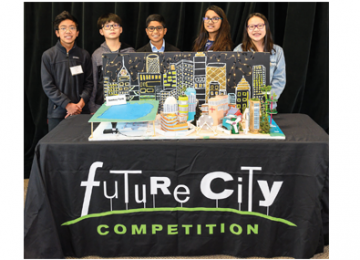
The 2020-2021 Future City program, with its theme Living on the Moon, will ask students in grades 6, 7, and 8 to design a futuristic lunar city that uses two Moon resources to keep its residents safe and healthy.

The 2020-2021 Future City program, with its theme Living on the Moon, will ask students in grades 6, 7, and 8 to design a futuristic lunar city that uses two Moon resources to keep its residents safe and healthy.
Now in its 29th year, the Future City program is unique in its emphasis on engineering in particular, giving middle school students in the United States, Canada, and around the world an opportunity to do the things that engineers do—identify problems, brainstorm ideas, design solutions, test, retest, and build, and share their results. Using the engineering design process and with guidance from an engineering mentor, students work in teams to research the Future City theme, develop a project plan, design a city 100 years into the future, build a scale model of their city from recycled materials, and present their city to a panel of judges.
A program of DiscoverE, Engineers Canada brought the Future City program to Canada for the first time during the 2016-2017 program cycle. Since then, student and educator feedback has demonstrated Future City’s success in engaging youth in STEM (science, technology, engineering, and math) subjects: 90 per cent of students indicated an increased interest in science and engineering, 83 per cent said they were motivated to pursue studies in science and engineering, and 80 per cent said they were considering careers in science and engineering. Teachers report that their students have a much better idea of what engineers do and the engineering design process after participating in Future City.
This year, for the first time, the Future City program will be offered entirely virtually in order to support in-class and at-home learning. In Canada, participants can choose to engage in one of two ways: they can complete all project deliverables and then compete in the regional and international competitions, which will be held virtually. Or they can choose to complete two of the five project deliverables, gaining the opportunity to participate in the program but without having to compete in the virtual competitions.
Participants will have the option to complete the deliverables in-person, or remotely, building one scale model or multiple model segments. They will take photos of their models to present as part of the virtual competitions, if necessary.
Also for the first time this year, Engineers Canada has entered a new partnership with Engineers of Tomorrow to pair an engineer mentor with students participating in the full competition, providing those students an opportunity to interact with an engineer to answer technical questions and support them as they work through the engineering design process. The engineer mentor will interact with the students through virtual meetings.
As the education system and teachers adapt to the challenges placed upon them by the COVID-19 pandemic, the Future City program is a way to support educators and help the next generation of engineers. There are a number of ways that members of the engineering community can help:
- Volunteer! Volunteer as one of the engineer mentors who will help guide students through the engineering design process. Share your experience as an engineer with them. Spark their imagination about the endless possibilities engineering offers.
- Panel discussions: Engineers Canada will be organizing a panel discussion and live Q&A later on in the competition cycle so that students have the opportunity to ask questions about the application of engineering and building a city of the Moon.
- Spread the word: Know a teacher? Know a parent/guardian of kids in grades 6, 7, or 8? Let them know about the Future City program and how it can be a great STEM learning activity for students that can be done either at home, or in the classroom.
For any questions about the Future City program, contact Kim Bouffard, Manager, Outreach, Engineers Canada at kim.bouffard@engineerscanada.ca.


